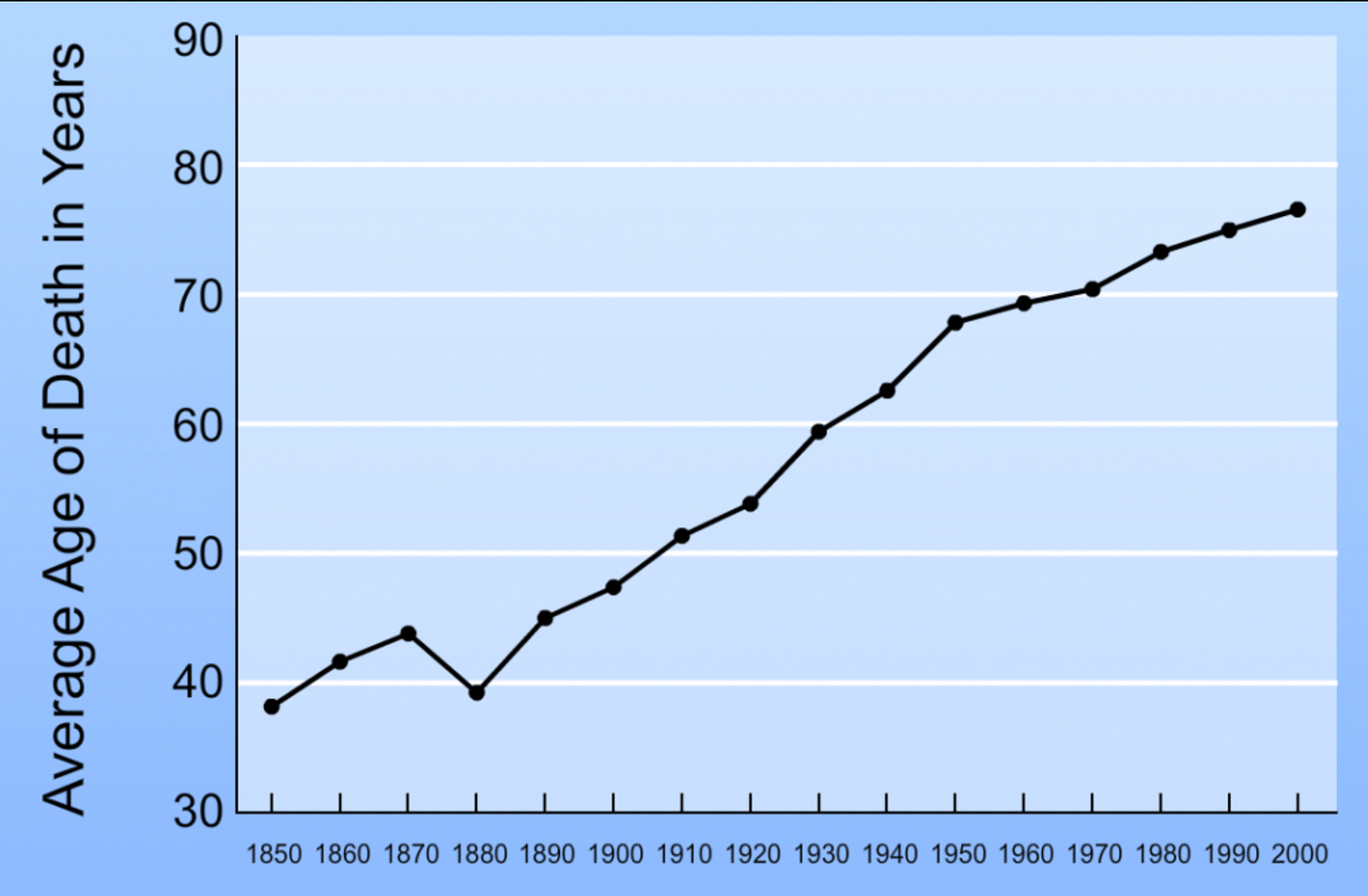Pushbutton Hiroshima
a preview of coming attractions
There’s no way to exaggerate the importance of the technological shift that happened in the last thirty years of the 19th century. We live it; the changes that reshaped human life in the decades after the Civil War are written in our daily routines. You live Drake’s Well, and thank God for that. Life expectancy soared, largely but not entirely due to the rapid decline in childhood mortality. Improvements in medicine, the development of modern surgery, stunning increases in industrial and agricultural productivity: all good news. We learned how to make more stuff, so life got easier.
Technological change had a long social tail; see, for example, the not-coincidentally-timed age of consent campaign that began in 1885. Machines made childhood as it was no longer necessary to start the babymaking with 15 year-olds to try to outrun death.
But people watching the explosive growth of technological know-how saw something else, and they were right. A Connecticut Yankee in King Arthur's Court, Mark Twain’s 1889 novel, sends a 19th century Connecticut industrial superintendent back to early medieval England; the Yankee, being clever and industrious, sets about fixing the 6th century. He builds them factories; they resist, the idiots. In the climactic battle, Hank Morgan faces an army of 30,000 knights, riding into battle to destroy him. Casually, he blows them up:
At last we could make out details. All the front ranks, no telling how many acres deep, were horsemen—plumed knights in armor. Suddenly we heard the blare of trumpets; the slow walk burst into a gallop, and then—well, it was wonderful to see! Down swept that vast horse-shoe wave—it approached the sand-belt—my breath stood still; nearer, nearer—the strip of green turf beyond the yellow belt grew narrow—narrower still—became a mere ribbon in front of the horses—then disappeared under their hoofs. Great Scott! Why, the whole front of that host shot into the sky with a thunder-crash, and became a whirling tempest of rags and fragments; and along the ground lay a thick wall of smoke that hid what was left of the multitude from our sight.
Time for the second step in the plan of campaign! I touched a button, and shook the bones of England loose from her spine!
In that explosion all our noble civilization-factories went up in the air and disappeared from the earth. It was a pity, but it was necessary. We could not afford to let the enemy turn our own weapons against us.
…Of course, we could not count the dead, because they did not exist as individuals, but merely as homogeneous protoplasm, with alloys of iron and buttons.
The technological revolution of the late 19th century radically expanded the comfort and safety of daily life, and also opened the door to Verdun and Dresden, Hisrohima and the Great Terror and an industrialized Holocaust — factory killing, efficient and inescapable, in which the dead “did not exist as individuals.”
The technological revolution of the Gilded Age was wonderful and horrible, a great gift and an unmistakable curse. It was both, together.
Today, the vastness of our shift to comfort and ease is equally remarkable. Food security is the great human struggle, and it’s mostly over (though, with incredible stupidity, we’re working on breaking that advance). In the United States, our number of farms and farmers is in free fall, and has been for eighty years. We can make more food with far fewer people; technology is making our lives far easier and substantially more secure. Our greatest health risk is obesity. In historical terms, that’s bizarre — an indescribably enormous break with the past.
But the last month has been a warning, to a degree that should feel like getting punched in the face. In Canada, truckers disagreed with the government — so banks shut off their money, which pretty strongly implies the subsequent loss of food, housing, and medical care. (Great news, though — with the wave of a hand, the banks mostly gave people their accounts again. Behold the beneficence of the Mighty Oz!)
More recently, ordinary Russians who have the great technological gift of extremely efficient commuter light rail payment systems have woken up to the discovery that Google and Apple have turned off their money in those systems.
Private corporations in other countries can turn off your money. They can do it casually, easily, without legal process or a warning. The Reuters headline underplays the point: “Ukraine crisis highlights Big Tech's potential to disrupt daily life.” Ya think?
Mark Twain called the 20th century; he saw the shape of the mass killing to come. In the updated version, Hank Morgan presses a button and turns off your food, energy, and money. There is mass murder in that growing capability. Do not doubt it.




See also the story about the trucker participating in the US Freedom Convoy in a rented truck, until Penske shut his truck off with a remote kill switch.
https://news.yahoo.com/texas-activist-driving-washington-d-225221317.html
Apply "remote kill switch" to autonomous farm machinery, for example, or to self-driving trucks that deliver food.